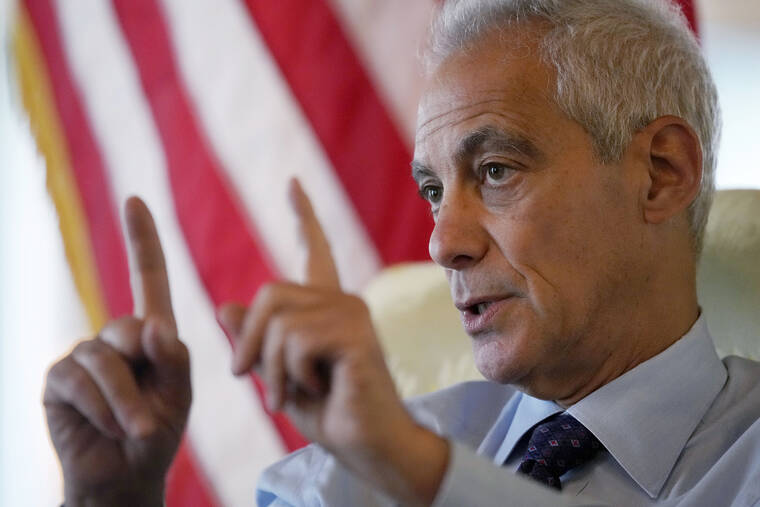The US ambassador to Japan warns of Chinese economic coercion
TOKYO >> The United States is working with Japan and other like-minded countries to counter China’s efforts to use its economic might to force political change around the world, the US ambassador to Japan said in an interview with The Associated Press on Tuesday.
Rahm Emanuel, who was previously Mayor of Chicago and President Barack Obama’s chief of staff, is pushing what he calls “commercial diplomacy,” the idea that the United States and Japan will be more eager to do business with each other and with similar collateral and stable countries amid worries caused by the COVID-19 pandemic, the war in Ukraine and China’s economic duress.
“From intellectual property theft to coercion to the debt addiction that China creates, the idea that they could actually honestly say, ‘We don’t force,’ and then you don’t have one, not two, not three — lots of global examples where they use their economic market access to force political change in a country… I think everyone woke up to that,” Emanuel said in the interview at his residence in the heart of downtown Tokyo.
Emanuel, who arrived in Japan in January, provided a number of examples of Chinese coercion, including with Japan, where Chinese supplies of rare earth metals have been blocked over a territorial dispute; South Korea, which suffered Chinese business boycotts after installing a US anti-missile defense system; Australia; and countries in Europe and Southeast Asia.
China’s growing economic importance and overseas spending have rattled these countries, which fear Beijing is expanding its strategic and political clout in their traditional spheres of influence.
China, through its Belt and Road Initiative, has become one of the largest lenders to developing countries to expand trade into Europe by building ports, railroads and other infrastructure in Asia, Africa and the Middle East. This has led to allegations that Beijing is using debt to gain political clout, but Chinese officials deny this.
China has been more assertive in urging other governments to embrace China-led initiatives, including a trade group, the Regional Comprehensive Economic Partnership.
Emanuel said finding ways for Japan and the United States to resist China’s economic coercion was one of the first issues he raised with the Japanese foreign minister.
Japan has expressed deep concern over increasing Chinese activity in regional seas, including near a Japanese-claimed island claimed by Beijing, and has urged peace and stability across the Taiwan Strait.
Emanuel praised Japanese Prime Minister Fumio Kishida’s pledge to “significantly increase” both the country’s defense budget and military capabilities.
Kishida’s attempts to overhaul Japan’s national security strategy and basic defense policies are a legacy of his hawkish mentor, former Prime Minister Shinzo Abe, who was assassinated in July.
Kishida also said he is open to developing potential pre-emptive strike capabilities, which opponents say would go far beyond Japan’s war-denial constitution, which limits the use of force to self-defense. Kishida has also proposed significantly increasing Japan’s defense budget over the next five years – potentially doubling it to 2% of GDP, a NATO standard.
“To the prime minister’s credit, he looked around the corner and realized what was happening in this region and the world – Japan needed to move forward in a way that it hasn’t done in the past,” Emanuel said.
Emanuel also mentioned economic opportunities for Japan and the United States in the areas of electric vehicle batteries, energy, new research and technology in small modular nuclear reactors, aerospace technology and semiconductors.
The business leaders he has met with as ambassador to Japan have historically evaluated an investment decision solely on cost, logistics and efficiency, he said, but they are now willing to pay more to avoid sanctions and instability.
“It’s a big rethink,” he said.
“Cost and efficiency have been the driving factors for the last 20 or 30 years. They drove public policy, and they drove corporate decisions. Today, costs and efficiency are being replaced by stability and sustainability,” said Emanuel.


Comments are closed.